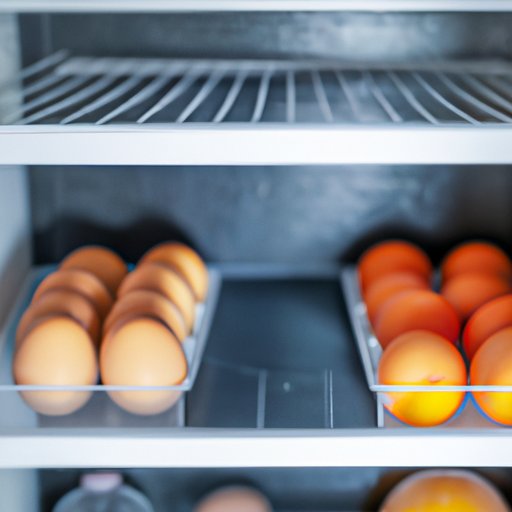Introduction
Fresh farm eggs are a popular food item with many health benefits due to their high nutritional value. But how long do fresh farm eggs last in the refrigerator? This article will explore the factors that affect the shelf life of fresh farm eggs and provide tips on how to prolong their storage time.
How Long Do Fresh Farm Eggs Last in the Refrigerator?
The shelf life of fresh farm eggs can vary significantly depending on a few different factors. Generally, when stored properly in the refrigerator, fresh farm eggs will stay fresh for up to 3-4 weeks. However, if not stored properly, the shelf life can be drastically reduced.
Factors That Affect Shelf Life
The shelf life of fresh farm eggs is affected by several factors, including:
- The quality of the egg
- How the egg was handled prior to storage
- The temperature of the refrigerator
- The humidity of the environment

Average Shelf Life of Fresh Farm Eggs
On average, fresh farm eggs stored in the refrigerator can last up to 3-4 weeks. The exact shelf life depends on the quality of the egg, how it was handled prior to storage, and the temperature and humidity of the environment.
Prolonging the Life of Fresh Farm Eggs in the Fridge
There are several steps you can take to prolong the shelf life of fresh farm eggs in the fridge. These include:
Refrigeration Temperature
The temperature of the refrigerator should be set to 40°F (4°C) or lower. Keeping eggs at this temperature helps to reduce deterioration and bacterial growth. Eggs should also be kept away from the warmest parts of the refrigerator, such as the door.
Avoiding Contamination
To avoid contamination, eggs should be stored in clean containers and away from raw meats and other strong-smelling foods. Additionally, eggs should never be washed before storage, as this can damage the protective coating on the shell and increase the risk of contamination.
Storing Eggs Properly
Eggs should be stored in their original carton or in an egg tray, which can help to keep them from breaking and spilling their contents. Additionally, the carton or egg tray should be placed in the coldest part of the refrigerator, such as the back of the top shelf.

Maximizing the Storage Time for Fresh Farm Eggs
In addition to the steps outlined above, there are several other ways to maximize the storage time for fresh farm eggs. These include:
Using an Egg Tray
Using an egg tray can help to keep eggs safe and prevent them from cracking or spilling their contents. Additionally, an egg tray can help to keep eggs organized and make them easier to find in the refrigerator.
Checking for Cracks
Before storing eggs, it’s important to check for cracks. Cracked eggs will spoil more quickly than intact eggs, so it’s best to discard any that have visible cracks.
Keeping Eggs Away from Strong-Smelling Foods
Eggs should be kept away from strong-smelling foods, such as raw meats and fish. This is because these foods can cause the eggs to absorb odors, which can affect their taste and texture.

Storing Fresh Farm Eggs for Maximum Freshness and Longevity
In order to maximize the storage time for fresh farm eggs and keep them in maximum freshness and longevity, several additional steps should be taken. These include:
Washing Eggs Before Storing
It’s important to wash eggs before storing them in the refrigerator, as this removes any dirt or bacteria that could lead to spoilage. When washing eggs, use warm water and a mild soap or detergent.
Discarding Any Bad Eggs
Any eggs that have visible cracks or bad odors should be discarded immediately. Eggs that have been in the refrigerator for more than 3-4 weeks should also be discarded, as they may have gone bad.
Refrigerating After Use
It’s important to refrigerate eggs immediately after use. This prevents bacteria from growing on the eggs, which can lead to spoilage.
Conclusion
When stored properly in the refrigerator, fresh farm eggs can last up to 3-4 weeks. To prolong the shelf life of fresh farm eggs, it’s important to keep them at the right temperature, avoid contamination, store them properly, and keep them away from strong-smelling foods. By following these tips, you can maximize the storage time for fresh farm eggs and keep them in maximum freshness and longevity.


